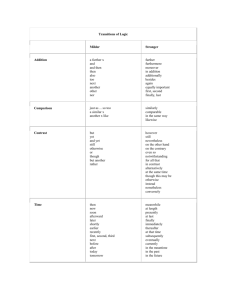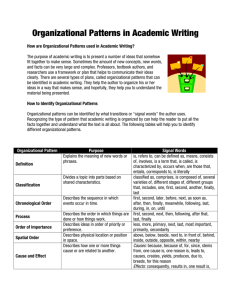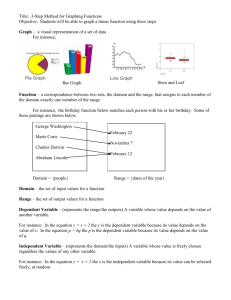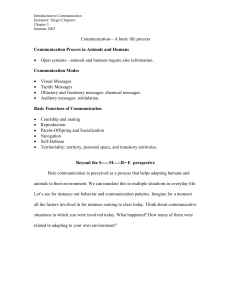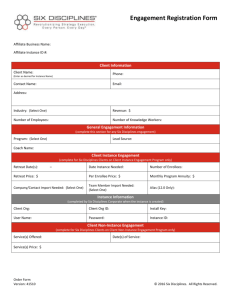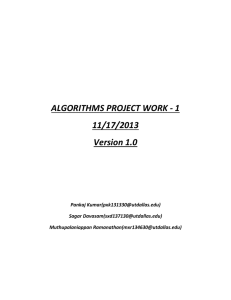How to Survive an Audit (Without Really Trying)
advertisement
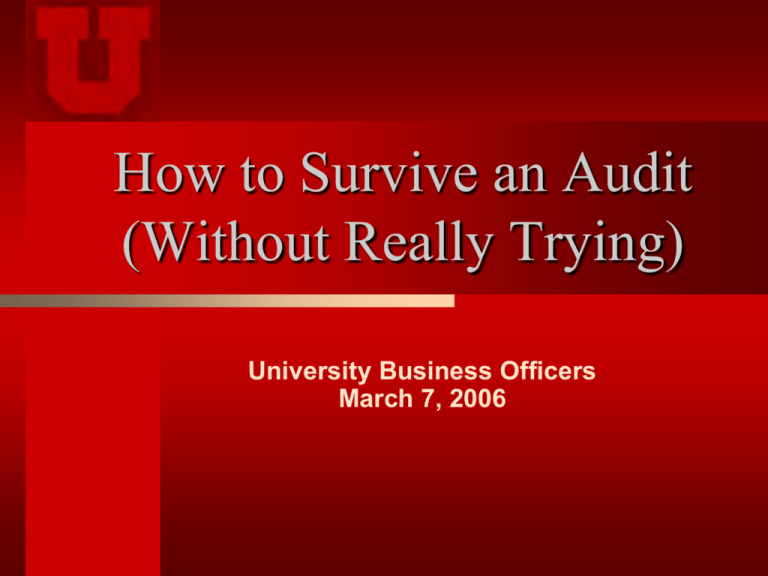
How to Survive an Audit (Without Really Trying) University Business Officers March 7, 2006 Step 1 Make sure you know what is happening! A Broad Overview of Internal Audit Services It’s not always an Audit Four Basic Types of Activities Audits – big projects scheduled in advance, selected for their value to senior management and the Board of Trustees Fiscal Accountability Reviews – limited projects designed to provide Deans, Directors, and Department Chairs a quick check on policy compliance, and utilization of sound business practices Analyst Projects – decision support for management Investigations - a collaborative effort to protect the university’s reputation and resources Types of “Audits” Financial – testing of underlying records to verify the reliability and integrity of official financial records Compliance – evaluates if you are following existing rules, regulations, laws and internal policy and procedure Operational Audits – looks at efficiency, effectiveness, and evaluates if are goals being met EDP/IT Auditing – evaluates computer systems and applications Audit Results are reported to the President, Board of Trustees, and line management. We do a formal follow-up review later. What To Expect Opening Conference – a chance for us to meet Preliminary Survey – To learn about you and your processes – Interviews, collecting forms, reports, & internal policy Field work – Interviews, testing internal controls, analysis of financial and other records Report – Drafted, reviewed, discussed, revised and issued - includes your responses Follow-up – 5-6 months later we come back to see what you’ve done Fiscal Accountability Review Developed as an informational tool for the Deans, as executive officers for the various colleges, and Departmental Chairs who are responsible for their individual departments It is intended to aid management in assessing their strengths and identifying opportunities for administrative improvement No in depth test work and no follow-up review Reported to the President and Board of Trustees Analyst Projects Requested by management Narrow focus on the topic of the request We may function as consultants, researchers, trainers, or in various other roles depending on the request The results are always reported to line management, and may be reported to senior management and the Board of Trustees if they touch on an issue with Institutional implications Investigations Conducted to determine the facts about an allegation May start with a “Hot Line” complaint, or as a request from senior management, the Office of General Counsel, Risk Management, the Department of Public Safety, or the Office of Equal Opportunity We try to protect the university’s assets and public reputation by confirming the extent of a problem and identifying possible solutions In some cases the focus is on identifying and recovering resources that have been misused or stolen Step 2 Fix the easy things now, before we get to your office The “Top Ten” The Most Common Issues Identified in Audits TEN University Assets Should Be Safeguarded FOR INSTANCE Current Lists of insurable or pilferable assets Current Software Records – lists or license files No slush funds Petty Cash and Change funds accounted for Personal Long Distance Call Reimbursement Process Records of University tools, equipment, keys, Id NINE Payroll Records Should Be Accurate and Complete FOR INSTANCE Faculty Time Must Be Tracked By the Department Sick Leave, Annual, Consulting PAR Certification Must Be Accurate and Should Be Signed By The Actual Employee Employees Should Enter and Approve Time In Kronos Supervisors Should Approve Their Employees Time Payroll Reporters Should Not Change Records Without Employee and Supervisor Written Approval EIGHT Generally Accepted Business Practices Should Be Followed FOR INSTANCE Revenues Should Be Reconciled to Supporting Documentation Credit Card systems should be settled daily. Deposits Should Be Made Within 3 Days Expenditures Should Be Reconciled To Supporting Documentation Pre-numbered receipt or cash registers SEVEN Expenditures Should Comply With University Policy FOR INSTANCE Original receipts and other documentation is required for all expenditures of university funds Some expenditures such as travel, entertainment, and flowers require specific additional documentation Travel Requires additional approvals Entertainment typically involves someone who is not a university employee Competitive Bids Reimbursements must be approved by higher authority SIX Health and Safety Should Be Protected FOR INSTANCE There should be posted evacuation plans Employees who drive on University business must have completed Defensive Driving Chemicals, Biological and Radioactive substances must be stored and disposed of correctly Hallways, stairs, doorways must be negotiable FIVE Side Systems Should Be Reconciled to PeopleSoft FOR INSTANCE Reconciliation should be completed at least once a month Separate Applications such as Accounts Receivable, Point of Sale Systems Excel spreadsheets used to track departmental activity Home grown databases – Access etc FOUR Duties Should Be Segregated FOR INSTANCE Two Pairs of Eyes on Every Transaction Custody – Receiving Record Keeping Reconciliation Authorization – Ordering, Disposal, Adjustments THREE Deficits Should Be Quickly Identified and Resolved FOR INSTANCE On CIS Management Balance Sheet Report Activity – Fund Balance Should Show Negative and Claim on Cash Balance Should Show Positive Activity – Funds Available Report Should Have a Smiley Face Projects – The Bottom Line on the Summary of Rev/Exp Report in the Budget Less Rev/Exp Column Should Be Positive TWO Critical or Sensitive Data and Systems Should Be Secure FOR INSTANCE Passwords should be unique and not shared Virus protection should be active and updated Backups completed and stored off site with tested restoration and recovery plans Critical data should be identified Storage of Sensitive data should be reviewed by ISO – generally there is no need to have it on PC’s Encryption should be considered – especially for laptops Equipment should be secured ONE Management Must Assume Responsibility For Oversight BECAUSE The buck stops there You can delegate work – you can’t delegate responsibility It’s Not the AA’s Job FOR INSTANCE The PI or Account Executive should understand the Management and Payroll Reports should review and approve with signature and date the Management and Payroll Reports Should ensure there are appropriate contracts and agreements to protect the department and University – employment agreements, vendor contracts, and research grants/contracts Should ensure those contracts or agreements are monitored Step 3 Uh Oh! Major Problem Fraud? An Investigation Can’t be Avoided Problems grow over time You can be part of the solution by ensuring that the Right People know about the problem as soon as possible Do not try to investigate yourself – that can lead to other problems – get the ‘experts’ involved. While investigations are never easy, the outcome is always better for you and the university if the problem is resolved while it is still small and manageable Things that need to be investigated Theft or misuse of university resources, including: Conflicts of interest Violations of contract and grant requirements Misuse of donated funds Violations of university policies and procedures Waste and abuse of authority Theft – inappropriate use or taking of University assets Involve the Right People When you suspect that someone in your department is doing something wrong you should contact the appropriate university officers and officials. Your supervisor and/or on up the line if needed The University Hotline – on line at www.ethicspoint.com or By phone at (888) 206-6025 (This is an outside group and you don’t have to identify yourself) The Office of General Counsel The Department of Public Safety Human Resources Risk Management It Protects You! Failing to report a crime is also crime Whistleblowers are protected under Utah law, and University policy Your department cannot recover lost income and property without an investigation Reporting stops the loss and sends a message that the behavior is unacceptable Why Didn’t I Mention Internal Audit? Call us by all means. Even if you are not sure there is a problem, we can offer advice and help sort out the issues We are the starting point for determining who will handle hot line complaints received through Ethics Point and we work closely with the other groups on campus If we aren’t the best group to do the investigation – we will contact the right group or let you know who to contact Chuck Piele – 581-6561 Pam Mollner – 585-3529 Margie Goodrich – 587-7732
